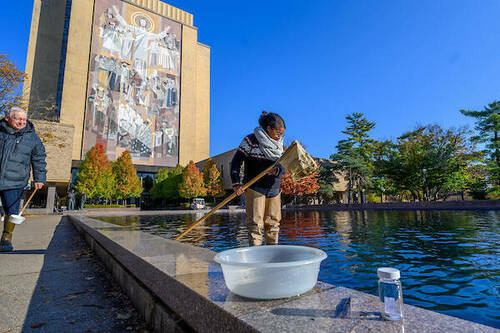
The University of Notre Dame has received $172.5 million in new research funding awards for fiscal year 2020 — the second highest in its history.
The awards received throughout fiscal year 2020 support an array of research, scholarship and creative endeavor, with many researchers working to address globally significant issues, including climate change, drug development, epidemiology and technology ethics. Toward the end of the fiscal year a call to focus on understanding and combating COVID-19 led to several new research funding opportunities.
“This year’s awards highlight how the University’s research programs are able to be flexible in the face of new and unforeseen challenges,” said Robert J. Bernhard, vice president for research and professor in the Department of Aerospace and Mechanical Engineering. “At Notre Dame, we are fortunate to have faculty who are driven by the University’s mission of being a powerful means for doing good in the world and are willing to pivot their research in order to address the most pressing issues of the day.”
When the University’s laboratory and research operations went into hibernation in March 2020 due to the ongoing pandemic, some Notre Dame researchers had already begun to change their focus toward understanding and combating the novel coronavirus. Whether researchers are working from home or back on campus as Notre Dame continues its phased reopening of laboratories and studios, some of the new research awards that support coronavirus-related studies — all of which were funded by the National Science Foundation to date — include:
- Funding to Kyle Bibby, associate professor and the Wanzek Collegiate Chair in the Department of Civil and Environmental Engineering and Earth Sciences, for wastewater-informed epidemiological monitoring. Bibby and his research team have been monitoring wastewater via samples throughout the Great Lakes region to develop methods of virus detection. They are working with Alex Perkins, associate professor in the Department of Biological Sciences, to connect their measurements to epidemiological models in order to compare rates of exposure, the onset of symptoms, transmission and detection.
- An award to Vijay Gupta, professor in the Department of Electrical Engineering, for the development of a meta-population level model that simulates the spread of the coronavirus and for utilizing reinforcement learning to design optimal congregation restriction policies for physical distancing. The goal of this research is to answer questions such as what are appropriate congregation restriction policies for social and physical distancing; and when should they be appropriately implemented.
- Funding for Jeff Harden, the Andrew J. McKenna Family Associate Professor in the Department of Political Science, for the study of varying state policy responses to the coronavirus. The research team is collecting data on state and local government reactions to ever-evolving information about the virus and on cases, fatalities and recoveries. The goal is to understand how those responses may have affected how the disease spreads.
- An award for Nosang Myung, the Keating Crawford Endowed Professor in the Department of Chemical and Biomolecular Engineering, to create a new material for antimicrobial masks. Through a collaboration with the University of Iowa, Myung will translate his existing water filtration technology to create a new fabric that will not only capture viruses, like the coronavirus, but also deactivate them.
- Funding to Alex Perkins to develop agent-based models, which simulates individuals and their movement patterns, for short-term projections. Perkins and his research team are aiming to build more accurate projections of how the coronavirus could spread based on how people live, work, and move, especially as various interventions such as shelter-in-place, school closures, and social distancing, are implemented and lifted.
Of the University’s 739 awards received in fiscal year 2020, approximately 77 percent came from federal funding, while 14 percent came from foundations and other sources and 9 percent came from industry. Overall, Notre Dame’s externally funded research had a global footprint of 50 grants in 41 countries, totaling $20.6 million. Researchers from the Colleges of Arts and Letters, Engineering, Science and Mendoza College of Business, as well as the Graduate School, Keough School of Global Affairs and Law School, were among the recipients of these awards.
Contact: Brandi Wampler / Research Communications Specialist / Notre Dame Research / University of Notre Dame / brandiwampler@nd.edu / 574.631.8183
Originally published by at research.nd.edu on July 21, 2020.